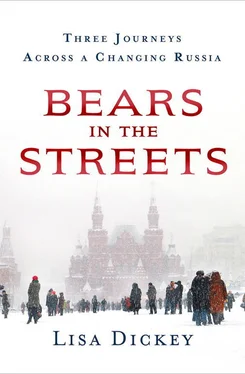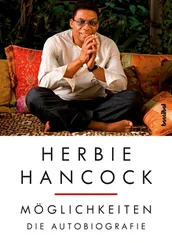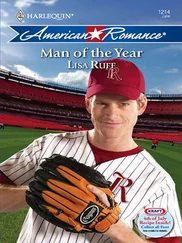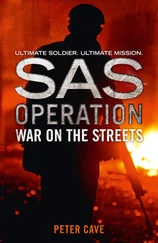We next got on the subject of Barack Obama. Like everyone I’d met on this trip—and I do mean everyone—Sergei and Lyuba expressed disdain, bordering on disgust, at the mention of his name. “He’s not trustworthy,” Lyuba said. “You can’t believe anything that comes out of his mouth.” Both felt that Obama was weak, and a liar. “What about Hillary Clinton?” I asked. Lyuba puckered, then shook her head as if shaking off a bad dream. “She is terrible ,” she said. “I can’t stand Hillary Clinton.” When I asked why, she said, “She’s like Obama. She lies.”
“Generally speaking, it’s not good for Russia when a Democrat is president,” Sergei told me. I asked whether they liked George W. Bush better, and both of them puckered again.
“So, which American president did you like, then?” I asked. “Assuming there were any.”
“Ronald Reagan,” they both said, to my amazement. The “Mr. Gorbachev, tear down this wall” president, the man who took credit for destroying the USSR—this is who they liked? “He stood for something,” said Sergei. “He said what he believed. He wasn’t sneaky.”
Inevitably, the conversation soon segued to Ukraine. “Do you know the history of Ukraine?” Lyuba asked me, in an echo of Big Igor’s question two weeks earlier. I responded that I had a general idea.
“There is no such thing as Ukraine!” Sergei and Lyuba exclaimed, almost in unison. “Ukraine was invented by Lenin,” Sergei said. “How can America claim it should maintain its independence from Russia, when it has always been Russian?”
“If there is no such thing as Ukraine,” I countered, “then what is the Ukrainian language?” Sergei answered that it was a Slavic language, basically the same as Russian, and only different because there was a mix of people—Poles, Russians, and other Slavs—in those regions. “But it has always, throughout history, been Russia. So what is happening now isn’t anything new or different.”
Clearly, the Ukrainian protestors on Kiev’s Maidan Square disagreed, but once again, as in my discussion with Masha, there didn’t appear to be any way to make traction with a counterargument. For as lighthearted as last night’s dinner had been, tonight’s was a litany of points upon which Sergei and Lyuba and I disagreed. Throughout it all, Anya and Max stared studiously at their phones, though every so often, Anya interjected that we should really get on the road back to Chelyabinsk. But then the discussion would heat up again, and I began to suspect we wouldn’t find common ground before it was time to go.
At long last, Sergei raised his glass. “Liza, we are glad you’re here. Even if we disagree with your government, we respect you.” This was another comment I’d heard consistently on the trip: every time someone criticized the American government, they were quick to clarify that they liked the American people.
I couldn’t help but think of my mother’s trip to the Soviet Union, all those years ago. Back then, when I was a child, it seemed extraordinary to me that she was able to separate her feelings about Russian people from feelings about their government. Now, I finally realized that that’s what Russians had been doing with me all along.
TEN
Kazan: The Soldier’s Mother
Just as the Russians in 2015 were talking about Ukraine, in 1995 they were talking about Chechnya. Everywhere Gary and I went on that first trip, people bemoaned the brutal war there, which started in December 1994 when Russian forces launched air and ground attacks on the capital city, Grozny. The conflict, which became known as the First Chechen War, was fierce and bloody, killing tens of thousands of civilians within the first few weeks and eventually turning Grozny into a bombed-out ghost town.
The conflict had many roots, but primarily it was about sovereignty. Chechens had been under the yoke of Russia for centuries. After the collapse of the Soviet Union, as former republics such as Armenia, Azerbaijan, and the Central Asian “stans” declared their independence, a movement arose in Chechnya to do the same. Former military pilot Dzhokar Dudayev became president of the Chechen Republic of Ichkeria in 1991, and in 1993, his government officially declared Chechnya’s autonomy. At first, the Russian government fought back through proxies, sending arms and funds to Chechen fighters opposed to Dudayev. Eventually, when the proxy war failed to achieve its goals, President Yeltsin sent Russian troops to attack Grozny.
Arriving in Kazan in November 1995, Gary and I decided to make the war our topic. Not only was Kazan as geographically close to Chechnya as we’d get, but it was the capital of the Tatarstan republic, which—like Chechnya—had a majority Muslim population. And though the war wasn’t specifically about religious differences, the fact that Chechens were Muslim did figure into the conflict.
As soon as we arrived, I began making calls to Russian army offices, hoping to find a returning soldier to interview. Not surprisingly, I was stymied: no one would talk to me, and when I left messages, no one returned my calls. Gary and I even showed up at one office in person, but we were shooed away without help or comment.
Frustrated, we turned to local journalists for help. One young reporter from Izvestia Tatarstana (News of Tatarstan) flipped endlessly through her Rolodex, making calls—and being rebuffed—on our behalf. She then recommended another journalist, Vladimir Muzychenko, who worked across the hall at Vechernyaya Kazan (Evening Kazan). We dropped by his office to find a stocky man in mended wool pants and a stained sweatshirt, his desk piled high with papers. “Call me Bob,” he barked, as he stuck out a beefy hand. “What do you need? I’ll take care of it.”
He began working the phone, shouting rapid-fire questions into the receiver, but even he couldn’t find anyone willing to meet with us. Then, he pulled a piece of paper from the teetering stack on his desk.
“This is a list of families of soldiers killed in Chechnya,” he said, then jabbed his finger at a name. “Here, go talk to this woman. She can introduce you to other soldiers who served with her son.” This seemed like a terrible idea, asking a grieving mother to introduce us to her dead son’s comrades, and it got worse when he told us the woman didn’t have a phone. “Just go to her apartment,” he said. “Here, take my card. You’ll be fine.”
With profound reluctance, Gary and I caught a taxi to a nondescript apartment block on the outskirts of the city. It took a while to find the right place, and then a stout, tired-looking woman answered the door. She eyed us warily, but when I handed her Vladimir’s card, she invited us in. As we walked into the living room, I noticed a framed photo of a good-looking young soldier, a black stripe superimposed across one shoulder.
The woman, Natalya, told us that this was her son Zhenya, who’d been killed in Chechnya ten months earlier. Her husband—Zhenya’s stepfather, Vladimir—was home as well, and the two of them told us the story.
* * *
Born in 1975, Zhenya was a friendly, chubby-cheeked boy with big brown eyes and dark, curly hair. “He looked like a little gypsy boy,” Natalya told us. “He always loved to be the center of attention, to be on stage.” During his school years, he performed in plays and talent shows, and he taught himself how to play guitar, piano, and drums. Eventually, he began writing his own music. His younger brother, Denis, idolized him.
After high school, Zhenya enrolled in Kazan’s Chemical-Technical Institute, where he started a band. He met and fell in love with a fellow student, Natasha K., and within months they were engaged. Surrounded by friends, his trusty guitar always within reach, the outgoing young musician was the life of the party. Then, in January 1994, 18-year-old Zhenya was drafted. The laws of conscription hadn’t changed since the Soviet era, and young men who were drafted typically served two years of service, usually in a location far from their hometowns.
Читать дальше












